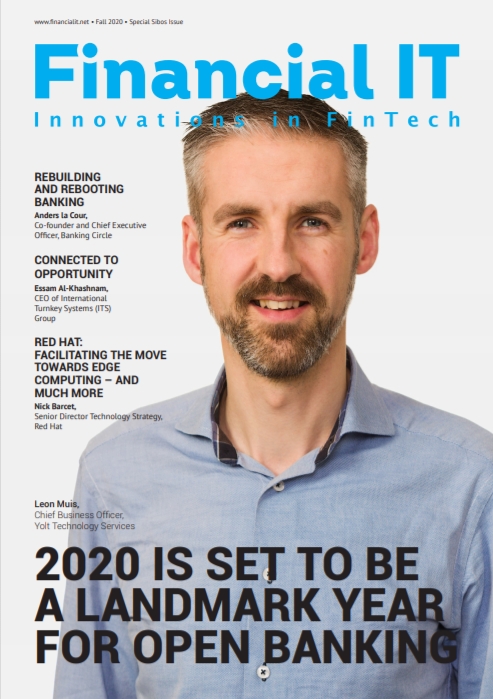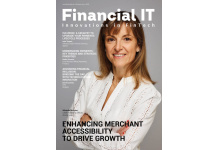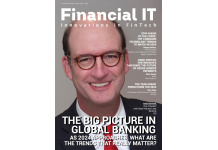Financial IT Fall Issue 2020

- 05 Oct, 2020 07:00 am
The Covid-19 Catalyst
Trends that were becoming clearer in June are now moving more rapidly.
Sibos 2020 will be a virtual conference. This fact alone highlights the enormous organisational disruption that is taking place in the global economy - and not just in the financial services and IT sectors - as a result of the Covid-19 pandemic. One of the lasting legacies of the pandemic will be a shift in people’s attitudes to physical location in the world. Working remotely - with colleagues, customers and suppliers - has become the norm.
It will remain the norm. As of September 2020, it is not clear that remote working has had a major and detrimental effect on the productivity of employees who are working from home rather than commuting to an office. Even if some companies have found that their teams are less efficient than previously, this calculation will be offset by the reality that the employees are effectively providing office space for free. In any case, employers’ obligations to their employees mean that the former are unlikely to demand that the latter commute to an office if there is significant risk of their catching Covid-19 in over-crowded public transport.
Of the five main impacts of Covid-19 on that part of the universe where financial services meets technology, organisational disruption was the first and the most important. Organisational disruption drives the other four impacts, but the converse is not really true. Covid-19 has brought disruption which has - in turn - has accelerated trends that were already in place. Covid-19 is a catalyst.
When people transact remotely, the potential for fraud increases. This was the second of the five impacts which we discussed in the Editor-in-Chief’s letter in the Summer 2020 edition of Financial IT. Experian plc and the National Hunter Fraud Prevention Service found that, across all financial products offered in the UK, fraud rates in April this year were 33% higher than previous monthly averages. In this edition of Financial IT, one of our contributors notes that there are typically 87 million credential stuffing attacks daily in the United States.
The rise in fraud is coinciding with an e-commerce boom - the third of the main impacts. This outcome touches on many of the topics covered by contributors in this edition of Financial IT. For example, one leading payments services provider whose leaders are interviewed are looking for the number of customers to surge from 3 million to 6 million over the course of 2021. Another contributor notes that the hybrid cloud - which facilitates e-commerce by allowing data and applications to move between between private and public clouds - is growing in popularity. Its research found that 56% of IT leaders already use hybrid clouds: more than half of the leaders who are not yet using hybrid clouds expect to do so in the future.
Surging e-commerce is providing a boost for digital banking. This is the fourth major impact of Covid-19. One report cited in this edition of Financial IT found that weekly online spending in the UK jumped from GBP1.52 billion to GBP2.47 billion between and February and June this year. The use of banking apps rose by one-third from March to April. Over half of all UK consumers regularly use mobile money management apps. The pressure is on banks and other payments services providers to make payments cheaper and quicker - especially if they cross national boundaries. One of our contributors cites research which recently found that 80% of retail banks and 74% of commercial banks have collaborated with external providers of financial infrastructure: a newer and faster network of correspondent banks is being built.
Three months ago, we surmised that Open Banking would start to focus on the delivery of loans, credit and other products for the liabilities side of clients’ balance sheets. We remain of the view that this will be one of the lasting impacts of the Covid-19 pandemic. There are already clear signs of financial stress among businesses and households. In this edition, one of our contributors notes that the largest 20 European banks set aside US$28 billion for bad debt in 2Q20: the eight largest banks in the United States set aside over US$40 billion.
Because of the irreversible surge in remote working, Covid-19 has grave implications for owners of office buildings and the banks that lend to them. At some stage, there will be a brutal reckoning. However, the timing and scale of that reckoning is outside the scope of Financial IT.
We wish all participants at Sibos 2020 a successful (virtual) conference.





















